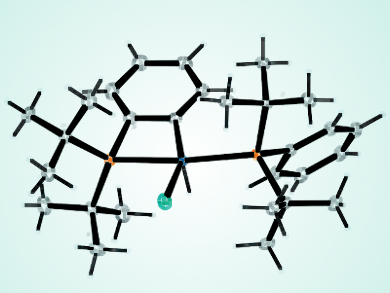Hans-Christian Böttcher and colleagues, Ludwig-Maximilians-Universität, Munich, Germany, synthesized the cyclometalated unsaturated Ir(III) complex [IrCl(H)(PtBu2C6H4-κ2P,C)(PtBu2Ph)] (pictured). [{Ir(μ-Cl)(coe)2}2] (coe = cis-cyclooctene) reacts with 4 equivalents of PtBu2Ph in CH2Cl2 at ambient temperature to give this complex.
Initially, the researchers aimed to generate trans-[IrCl(coe)(PtBu2Ph)2]. Instead, oxidative addition of one phosphane ligand resulted in [IrCl(H)-(PtBu2C6H4-κ2P,C)(PtBu2Ph)] in high yield. This coordinatively unsaturated species reacted smoothly with the strong π-acceptor ligands CO and NO+, affording iridium(I) complexes trans-[IrCl(CO)(PtBu2Ph)2] and trans-[IrCl(NO)(PtBu2Ph)2]+, respectively.
Originally, the researchers expected addition reactions with these small molecules. Instead, inversion of cyclometalation was observed. According to the team, this reaction behavior can be explained by a better donor-acceptor interaction in the resulting iridium(I) product than is the case for the starting iridium(III) complex.
- Cyclometalation of Phosphanes at Iridium(I): Interplay with Intramolecular Reductive Elimination Induced by the Strong π-Acceptor Ligands CO and NO+,
Hans-Christian Böttcher, Merlin Junk, Peter Mayer, Wolfgang Beck,
Eur. J. Inorg. Chem. 2015.
DOI: 10.1002/ejic.201500363




